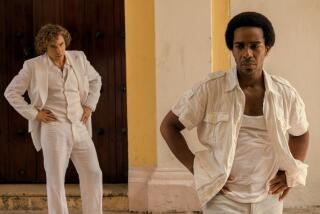Under Oath, Liggett Owner Says Cigarettes Are Addictive
- Share via
MIAMI — Testifying in court for the first time since the defection of his maverick tobacco company, Liggett Group owner Bennett S. LeBow told jurors Monday at a landmark secondhand-smoke trial that cigarettes cause cancer, heart disease and emphysema and are “very addictive . . . for many people.”
LeBow, who shook the industry in March when he acknowledged the dangers of smoking as part of a legal settlement, said he was proud of Liggett’s history-making step.
“I believe we absolutely did the right thing,” he said. “We’d do it again in a second.”
Liggett, the fifth-largest cigarette maker, with about 2% of the U.S. market, made peace in large part to avoid being crushed by legal costs. But the jury in Dade County Circuit Court in Florida was not permitted to hear that Liggett’s admissions were part of a legal settlement, as opposed to a simple change of heart.
LeBow, chairman of Liggett owner Brooke Group Ltd., also testified that industry leader Philip Morris for a time was paying Liggett’s legal fees. A plaintiffs’ lawyer described this as an attempt to “buy [LeBow’s] silence,” but he said it without the jury present.
The case was filed on behalf of airline flight attendants who claim to have suffered illnesses from breathing secondhand smoke before the airline smoking ban was imposed. It is the first class-action suit ever tried against the tobacco industry, as well as the first case alleging harm to bystanders from other people’s cigarettes.
Lawyers in the case gingerly questioned LeBow to avoid exposing jurors to discussion of tobacco settlements, which Judge Robert P. Kaye has declared forbidden ground. Wearing a dark suit and almost fluorescent blue tie, the bearded, 59-year-old executive spent more than an hour on the witness stand but talked for no more than 10 or 15 minutes.
His testimony was interrupted by a barrage of defense objections, resulting in numerous sidebar conferences with the judge and in jurors twice being sent out of court so the lawyers could debate admissibility questions.
“I think the industry made a mistake in objecting constantly,” said Gary Black, a tobacco analyst with Sanford Bernstein. “It almost made LeBow seem more important than he is.”
The judge has ordered parties in the case not to discuss either of the two big tobacco settlements: Liggett’s deal in March with a group of state attorneys general, and the giant “global” settlement of June 20, in which Liggett’s larger rivals agreed to pay $368.5 billion in exchange for eliminating state lawsuits and most private class actions.
Apart from a vast difference in money, a crucial distinction between the two settlements is that Liggett agreed to admit the hazards of smoking and to surrender potentially incriminating documents that could be used against the other companies. In their settlement, the other companies agreed to various anti-smoking measures but made no admissions, thereby preserving their ability to defend remaining court cases.
In the secondhand-smoke case, one of the matters not settled, the companies maintain that smoke in airline cabins was far too diluted to cause lung cancer or the other illnesses cited by the plaintiffs.
Liggett is accused along with the other firms, but it has taken a position that hardly bolsters the defense. Claiming that Liggett does not know whether secondhand smoke is harmful, Liggett lawyer Michael Fay has merely asked the six jurors to carefully consider the evidence.
In testimony elicited by Rosenblatt, LeBow said Liggett recently placed the statement, “Warning: Smoking is addictive,” on all of its brands to supplement the mandatory warnings.
The plaintiffs’ strategy has been to persuade jurors that cigarette makers have lied for so long about the dangers of smoking that their denials about secondhand smoke should be given no weight.
Rosenblatt asked LeBow only one question about secondhand smoke, getting him to say he had no basis to disagree with the U.S. surgeon general and Environmental Protection Agency that secondhand smoke is dangerous.
LeBow also testified that in December 1995, financially wobbly Liggett entered into an agreement under which Philip Morris began paying Liggett’s legal fees--which LeBow said were then running about $10 million a year. (Philip Morris in the past has acknowledged paying part of Liggett’s fees.)
LeBow said Philip Morris backed out of the agreement after five or six months, but defense lawyers objected and he did not explain why.
Philip Morris “obviously did not pay [LeBow’s] legal fees out of the goodness of their heart,” Rosenblatt told the judge after the jury filed out. Philip Morris was trying to buy “his silence and his cooperation so he would not be a spokesman for” the other side, Rosenblatt said.
In public statements before the trial, Liggett’s rivals have accused it of cynically surrendering to boost its business--but such assertions are taboo in this case.
But Brown & Williamson lawyer Edward Moss reminded LeBow that he had expressed much different views when Rosenblatt took his deposition in the case in November 1993. At the time, LeBow said he did not believe cigarettes were addictive, saying he had quit without great difficulty.
He also testified that he did not know whether smoking causes lung cancer and did not much care, as long as he was selling a legal product.
“As I understand your position, generally, that kind of issue is somebody else’s battle, and you’re going to do your thing, as long as it is legal to do it?” Rosenblatt had asked LeBow in 1993.
“That is correct,” LeBow replied.
Under cross-examination, LeBow said his opinions in 1993 were honestly held but that his thinking had changed, leading up to his public admissions three months ago.
More to Read
Inside the business of entertainment
The Wide Shot brings you news, analysis and insights on everything from streaming wars to production — and what it all means for the future.
You may occasionally receive promotional content from the Los Angeles Times.










